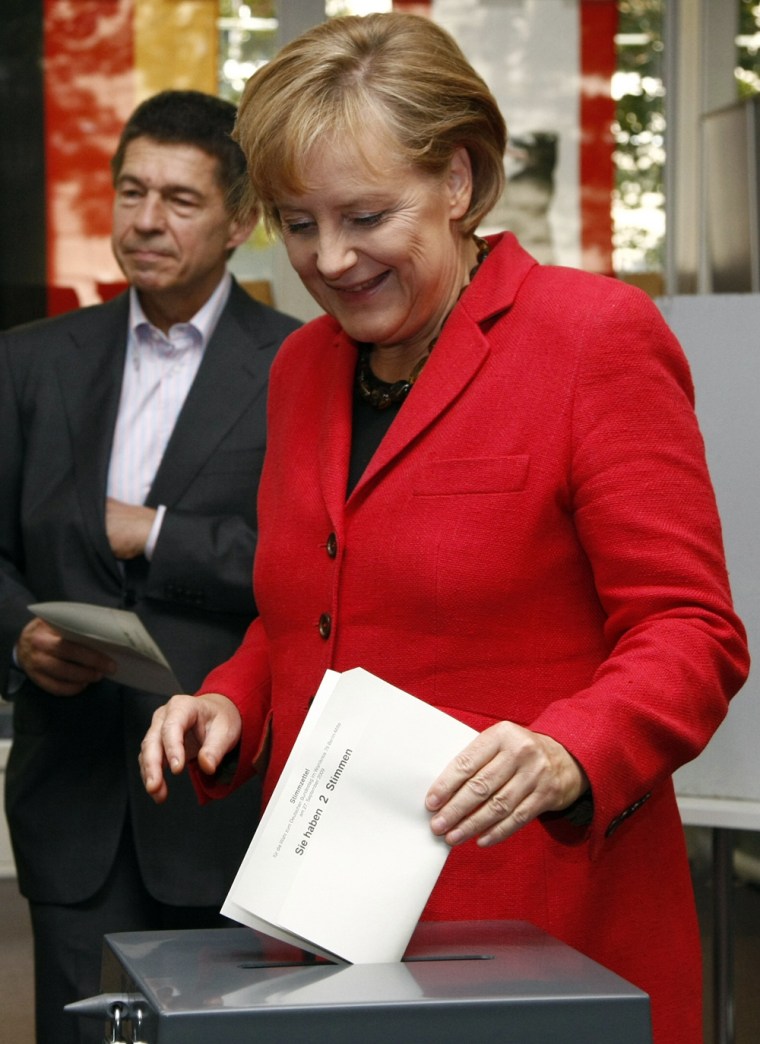German Chancellor Angela Merkel won a second term on Sunday, along with the center-right majority that eluded her four years ago — nudging Europe's biggest economic power to the right as it claws its way out of a deep recession.
Voters sent the nation's main left-wing party, the Social Democrats of Foreign Minister Frank-Walter Steinmeier, into opposition after 11 years in government. It was the party's worst parliamentary election result since World War II.
The conservative Merkel ended her four-year "grand coalition" with Steinmeier's party thanks to a record showing by her new coalition partner, the pro-business Free Democrats. Her own Christian Democratic Union performed unimpressively.
"Tonight we can really celebrate," said a beaming Merkel, greeted by chants of "Angie! Angie!" from supporters. "(But) there are many problems in our country to be solved."
A subdued Steinmeier vowed to lead a strong opposition. "There is no talking around it: this is a bitter defeat," he said.
Merkel's CDU and its Bavaria-only sister, the Christian Social Union, won 33.8 percent of the vote and the Social Democrats took 23 percent. The Free Democrats captured 14.6 percent, the Left Party 11.9 percent and the Greens 10.7 percent.
That gave the conservatives 239 seats and the Free Democrats 93 in the lower house — for a comfortable center-right majority of 332 seats to 290. The Social Democrats won 146, the Left Party 76 and the Greens 68.
It was a major shift from the 2005 election, in which Merkel's conservatives just squeaked past the Social Democrats.
The White House said President Barack Obama called Merkel to congratulate her and "looks forward to continued close cooperation" with her. French President Nicolas Sarkozy also congratulated her.
More pressure to ‘forge an agenda’
Merkel's second four-year term will be markedly different from her first, in which she presided over a middle-of-the-road government that was fractious but enjoyed a huge parliamentary majority.
Heather Conley, director of the Washington-based Center for Strategic and International Studies' Europe Program, said the new government "is going to place much more burden on Chancellor Merkel to forge an agenda and implement it."
Merkel's popularity has been fueled by her consensual approach. She will now lead a narrower coalition with a stronger opposition and a self-confident new partner, but suggested that she will stick to her own style.
"My understanding was, and my understanding is, that I want to be the chancellor of all Germans," she told supporters, adding that protecting and creating jobs "will be my highest aim."
Guido Westerwelle, the leader of the Free Democrats, is expected to be the next foreign minister. His party is returning to government after an 11-year absence.
"We are pleased with this exceptional result but we know that above all else, this means responsibility," he said.
‘Swift and decisive’ coalition talks
Merkel vowed "swift and decisive" coalition talks, likely to be shorter than the two months of haggling that produced the "grand coalition" in 2005.
Merkel and Westerwelle will now have to figure out how to deliver on pledges of tax relief — promises that Steinmeier had said were unrealistic as the government is running up huge debts to tackle the country's economic crisis.
Both argued that tax cuts would boost the economy, ultimately leading to higher tax revenue.
Yet Merkel has called for modest middle-income tax relief, while Westerwelle — who successfully portrayed his party as a champion of the middle class and small business — has called for far deeper tax cuts, with significant reductions in both the top and bottom rates.
"That will be the Achilles' heel of the Free Democrats and the (new) coalition as a whole, because it will not be possible to cut taxes," predicted Heinrich Oberreuter, a political science professor at the University of Passau.
One change should be easy: Both the conservatives and the Free Democrats want to halt a plan to shut down Germany's 17 nuclear power plants by 2021, and extend the lives of some until more renewable energy is available.
Afghanistan withdrawal will be challenge
A key challenge for the new government will be to work toward a strategy for the eventual withdrawal of the more than 4,200 German troops in Afghanistan, a mission that has become increasingly unpopular.
Conley said there would not be a "run toward the exits."
"What I would suspect is that the new government will take an opportunity to do its own strategic review of where the forces are and how it will continue," she said.
Al-Qaida and Taliban militants have threatened Germany over its involvement in Afghanistan, prompting increased security ahead of the election. Authorities on Saturday banned all flights over Munich's Oktoberfest beer festival, which draws 6 million visitors, until it ends Oct. 4.
Germany's mainstream parties all agree on the need to better train Afghan police and soldiers so that NATO soldiers eventually can be pulled out, but have set no withdrawal date.
Westerwelle has praised the outgoing government's carrot-and-stick approach to Iran over its nuclear program.
The coalition change may eventually mean a tougher approach to Turkey's European Union membership bid, which Merkel's party opposes while the Free Democrats appear noncommittal.
Merkel's new government is well-placed in the upper house of parliament, which represents Germany's 16 states and needs to approve major legislation. Several of Germany's most populous states have center-right governments.
The result Sunday was particularly painful for the Social Democrats, far undercutting their previous postwar worst — 28.8 percent in 1953. However, Merkel's party also performed poorly.
The conservatives' result wasn't much better than their worst performance, 31 percent in 1949.
Germany's three opposition parties gained support, with all achieving their best results ever. In 2005, all three parties scored less than 10 percent of the vote each.
"The attractiveness of the big parties is crumbling and that of the small parties is increasing significantly," Oberreuter said.
Turnout Sunday was 70.8 percent — a new postwar low, down from 77.7 percent four years ago.
